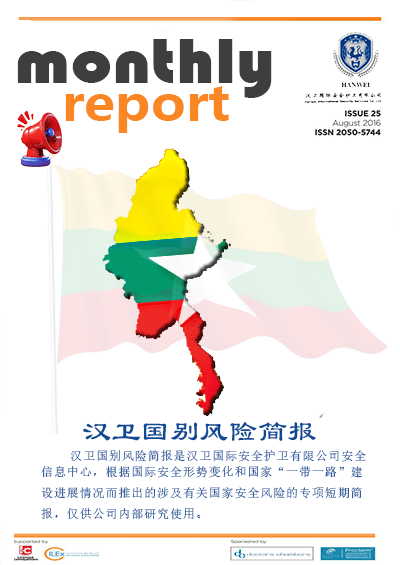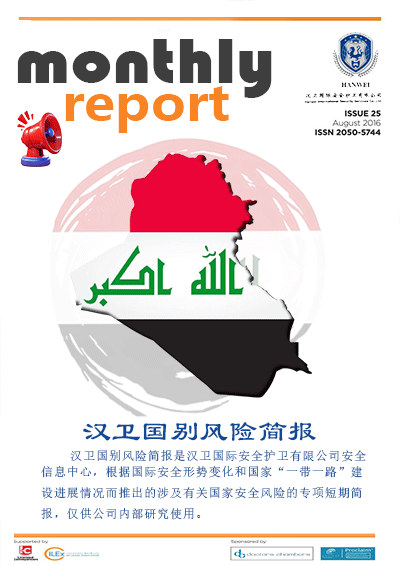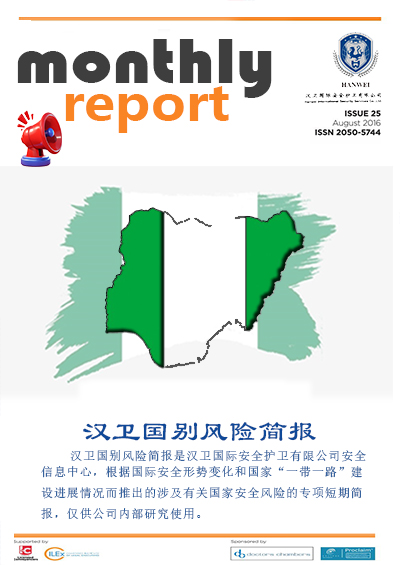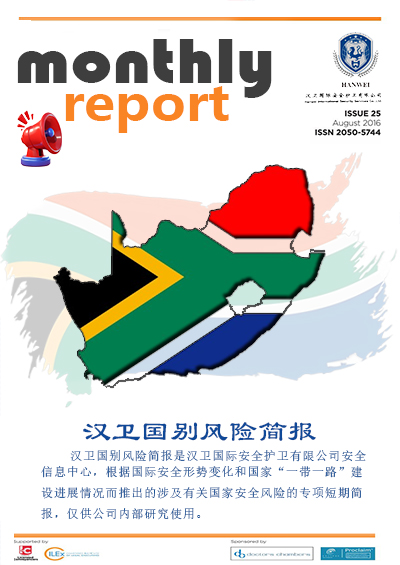South Africa December 2024 Social Security Situation Analysis
Researcher No. 006
According to monitoring reports from Hanwei International's security officers stationed in South Africa and related media coverage, Hanwei International analysis suggests that this month's overall security issues in South Africa remain prominent, with law enforcement and security facing significant crises and challenges. South African society is grappling with severe water shortages and electricity supply tensions, which not only cause great inconvenience to residents' daily lives but also pose threats to social order and stability; recorded cases of kidnapping, theft/robbery this month involved multi-scenario crimes resulting in serious casualties and property losses; political instability in neighboring Zimbabwe and Mozambique, as well as controversial simplified visa policies for Nigerians.
As China's comprehensive strategic partner in the new era, South Africa maintains close and friendly cooperative relations with China in political, economic, cultural and other fields. However, on December 26, news emerged that core members of the US Republican Party are pressuring the incoming Trump administration to urge the South African government to change its stance towards Russia, China, Iran, and Israel, or risk losing preferential trade treatment with South Africa. Although no direct orders have been issued, relevant stakeholders should prepare accordingly.
First, South Africa faces water and electricity shortages, including water pollution incidents.
This month's tracking shows water shortages and electricity supply issues mainly concentrated in Johannesburg, Gauteng Province, with strong public reactions. By the end of November 2024, Johannesburg City and its municipal power company had accumulated R4.9 billion in unpaid electricity bills to Eskom, with an additional R1.4 billion in new bills overdue. Eskom had previously issued notices of planned power cuts under the Promotion of Administrative Justice Act, but early this month announced suspension of the plan following intervention by the Energy Minister and agreements reached with the parties. While the temporary suspension of power cuts has alleviated residents' concerns, this is not a long-term solution. Johannesburg's longstanding water management problems, with aging infrastructure causing nearly 30% water loss, were exacerbated this month during maintenance work by Rand Water at Eikenhof and Zwartkopjes pump stations, leading to severe water supply disruptions in multiple areas. Despite water tanker deployments, some residents complained about inadequate assistance. On December 4, Anstey's Beach and uMhlanga Beach in Durban, KwaZulu-Natal were urgently closed due to water quality issues, with E. coli levels six times above safety standards.
Second, multiple kidnapping cases involving Chinese nationals and businessmen occurred this month, with security companies demonstrating exceptional capabilities.
South Africa's latest quarterly crime statistics show 4,627 reported kidnapping cases in Q3 2024, with Gauteng Province being the worst affected area (2,498 cases, over half the national total), primarily involving ransom extortion, blackmail and human trafficking.
Chinese kidnappings:On December 9, a Chinese national surnamed Chen was hijacked and kidnapped in Springs, Ekurhuleni, Gauteng. The victim's family immediately sought help from a South African security company, which coordinated with SAPS Special Task Force, Gauteng Anti-Kidnapping Unit and negotiators to conduct an efficient rescue operation. Within 24 hours, they located the suspects through intelligence and successfully rescued the victim. On December 30, a Chinese national in Free State was kidnapped at gunpoint while going to deposit money at a bank. The family sought help from the local Chinese community while police launched rescue operations. The victim twice attempted to seek help from passing traffic police vehicles during captivity, succeeding on the second attempt as the kidnappers fled in an unmarked vehicle.
Businessman kidnapping:On December 11, an Eastern Cape businessman inspecting his premises was kidnapped by three armed suspects who have since made unspecified ransom demands.
Third, diverse robbery patterns including religious venues.
Cash-in-transit heists:On November 30, Gauteng police prevented a planned cash-in-transit robbery after receiving intelligence. That evening, an actual heist occurred on R510 Road near Sandfontein village, North West Province, where suspects used a Mercedes to stop the armored vehicle, threatened guards with firearms, then blew it up with explosives before escaping with cash. Smash-and-grab: N1 highway leading to Cape Town CBD in Western Cape has become a hotspot for smash-and-grab robberies, with one driver's recent morning rush hour ordeal drawing widespread attention.
Tourist robberies:On December 14, Table Mountain National Park patrols thwarted a tourist robbery in Western Cape, arresting two suspects. Church robberies: Criminal activities have expanded beyond vehicles and residences to religious venues, with perpetrators posing as worshippers to blend in before robbing congregants during prayers or offerings, targeting cash, phones, watches and other valuables.
Fourth, border vulnerabilities this month raise questions about whether simplified Nigerian visa policies will exacerbate domestic security risks.
Zimbabwe:Limpopo Province's border areas with Zimbabwe face severe challenges from illegal immigration and smuggling, particularly hotspots along the Limpopo River near Musina and Pontdrift. Limited resources, complex terrain and regional economic issues hinder law enforcement, while informal border settlements exacerbate problems. Zimbabwe's economic crisis and human rights issues drive illegal border crossings, involving not just food and daily necessities but also dangerous contraband.
Mozambique:On December 26, Mozambique descended into chaos following disputed presidential elections, with nationwide protests destroying social order through tire burnings, road blockades and infrastructure damage. During protests, over 1,000 inmates escaped from a high-security Maputo prison, some armed. South Africa claims enhanced border control during Mozambique's turmoil, but any spillover would primarily affect South Africa.
Nigeria:On December 5, President Ramaphosa's statement at the 11th South Africa-Nigeria Bi-National Commission that "Nigerian visitors won't need passports for visa applications" sparked major controversy and public concerns about border security. Nigeria's severe social security risks from wealth inequality, armed conflicts, terrorism and extremist activities make simplified visa procedures counterproductive for South Africa's overall security situation.
Hanwei International recommends the following precautions for Chinese enterprises and individuals in South Africa:
First, monitor protest and strike information, avoiding Zimbabwe and Mozambique border areas.Recent water and electricity shortages, especially in Johannesburg, Gauteng, significantly impact daily life and may trigger serious protests. President Ramaphosa's comments at the SA-Nigeria Commission sparked strike waves protesting perceived prioritization of foreign interests, while simplified Nigerian visa procedures may worsen domestic security. Chinese nationals should stay informed, avoid protest sites to prevent violence, and note that border areas face severe security challenges from illegal immigration and smuggling - with Mozambique's political turmoil increasing illegal crossings by 25%. Avoid border areas unless necessary, employing professional security when required.
Second, small businesses and individuals should enhance security awareness.This month's kidnappings, thefts/robberies primarily in Gauteng, Western Cape and KwaZulu-Natal pose serious threats to life and property. The Chinese Consulate in Johannesburg advises: Businesses in remote areas should strengthen security during opening/closing with reinforced doors, professional guards and group procedures; adjust operating hours and travel routes, watch for suspicious followers, and avoid keeping large cash sums or valuables on premises or persons.




